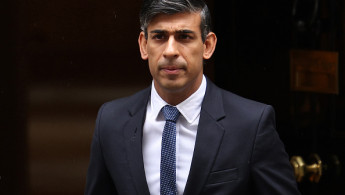Rishi Sunak will face UK lawmakers over his decision to join US strikes on Yemen's Houthis
Prime Minister Rishi Sunak was due to face Parliament Monday to explain why the UK joined the US in striking Houthi targets in Yemen — and why British lawmakers did not get a say on the military action.
Four Royal Air Force Typhoon jets took part in last week’s US-led strikes on sites used by the Iran-backed rebels, who have been attacking commercial ships in the Red Sea. The US says Friday’s strikes hit Houthi weapons depots, radar facilities and command centers.
The Houthis say they have targeted ships linked to Israel in response to the war in Gaza. US forces carried out another strike Saturday on a Houthi radar site .
British Defense Secretary Grant Shapps said Monday that Friday's strikes had been intended "as a single action" rather than part of a campaign, but did not rule out UK participation in further military strikes.
"We will now monitor very carefully to see what (the Houthis) do next, how they respond and we will see from there," he said.
Keir Starmer, leader of Britain’s main opposition Labour Party, said he supported last week’s strikes but expects more openness from the government in future.
"If the government is proposing further action, then it should say so and set out the case, and we’re going to have to consider that on a case-by-case basis on the merits," he said.
The smaller opposition Liberal Democrats accused the government of "riding roughshod over a democratic convention" that Parliament should get a vote on military action.
"For Rishi Sunak to attempt to ignore elected representatives is disgraceful," Liberal Democrat defense spokesman Richard Foord said.
Sunak’s government is facing mounting demands on Britain’s ever-shrinking military in an increasingly volatile world. Hours after the strikes on the Houthis, Sunak was in Kyiv , where he announced a further 2.5 billion pounds ($3.2 billion) in military aid to Ukraine and signed a long-term security agreement with President Volodymyr Zelenskyy.
Sunak — whose Conservative Party trails Labour in opinion polls ahead of an election due this year — also is struggling to revive his stalled plan to send asylum-seekers to Rwanda.




 Follow the Middle East's top stories in English at The New Arab on Google News
Follow the Middle East's top stories in English at The New Arab on Google News

![A group of Palestinians, foreign and Israeli activists gather to participated in an olive picking event on the land in the town of Battir, which is under threat of confiscation by Israel in Bethlehem, occupied West Bank on 8 November 2024. [Getty]](/sites/default/files/styles/image_330x185/public/2182930803.jpeg?h=199d8c1f&itok=__0LgGsa)
